#Oedipus Rex
Text
I wanna share my theory of No Longer You with y’all.
(This would be part one. And the post may get a bit long I’m sorry)
First, let me ask you a question (which has been asked a lot): had Teiresias really helped Odysseus?
I want to make a little analysis before I put my conclusion here.
From Odysseus’s POV, every word that Teiresias had just said is against him:
Teiresias said, “There is a world where I help you get home, but that’s not a world I know.” Then Odysseus replied with a “What™️?” (Ok, think about it: Circe asked him to there might be a way to evade him, there might be a way to get home.” And she instructed him to visit Teiresias, and now Teiresias told him that he’s not gonna help him? Odysseus was having a hard time accepting the truth.)
Then Teiresias related to him all these things he saw, (and remember we’re look at it in Odysseus’s POV), and it’s bombarding Odysseus so hard, that it goes like this: “your romance is past; your men is sacrificed (it’s singular nevertheless); you’ve been (or will be) betrayed time and again; your brother is dead (Polites); you’re on the brink of death; and then you died; a man gets to make it home alive, but it’s not you.”
This is why Odysseus replied, “This can’t be. We’ve suffered and sailed through the toughest of hells and you tell us our efforts for nothing?” (It’s like, “Impossible. You’re telling me that everything we’ve done is meaningless cuz in the end it’s only a man who’ll make it home, and he’s not even me???”)
Teiresias continued, (the following is still in Odysseus’s POV) “Your palace is covered in red—your royalties are all dead; the dead people are men who believe you’re long dead—they’re dear to you, and now they’re all dead; your wife is with someone who’s haunting her, someone who has killed all of those people—he’s gonna take possession of her.”
Odysseus can no longer suppress his anger, “WHOOOOOO?!”
And Teiresias repeated his words again, making Odysseus think that everything is ruined. This is why Odysseus is spiraling, cuz he’s having such a turmoil, and an urge to avoid this kind of future at all costs, with whatever it takes.
But we see things a bit differently.
We see the song of past romance as their long waited reunion; we see the sacrifice of man as a price for him to get home; we see the betrayal as the weakness of his crew that led them to their own destruction; we see him dying but know that he’s not going to die on his way home; we see a man who gets home alive but no longer him cuz he has changed (and a little reference to his disguise). We knows that Teiresias was telling the truth, but from another perspective. We know that it’s him who’ll slaughter the suitors and leave his palace covered in red; we know that the men who had long believed he’s dead are those suitors who woo the presumed “widow” of Odysseus, and we know that the man who is haunting, the man with a trail of bodies, is none other than Odysseus himself.
We know Teiresias was trying to warn Odysseus about his changes, and Odysseus misunderstood him.
Odysseus tried to prevent everything from happening, as the meme goes, “Someone is going to do the killing. I’ll ensure that someone is me.”
So Odysseus continued to change, precisely one song later, and he finally became the one in Teiresias’s vision.
And everything did happen according to Teiresias’s visions.
He tried to avoid the inevitable, but it’s he who makes the inevitable happen, though not precisely as he thought it would be.
It’s nothing someone else who would do the killing. It’s himself all along. Everything is directed towards himself.
Yep, see the pattern here? It’s a topic so well known that no one could’ve missed it in their mythological reading. It’s about fate.
As in one of the most famous literature works, Oedipus Rex.
A work which also involves the appearance of a man, who was none other than Teiresias.
You see, Teiresias was trying to warn Oedipus that he would find the criminal in himself, that he himself was the murderer he’s looking for. Oedipus tried to denied the words, tried to inflict all these curses upon the murderer he sought, but in the end, it was all directed towards himself.
And as audience (readers to be exact), we know that Teiresias was telling the truth for the entire time.
The Teiresias in Epic the musical isn’t the Teiresias in the Odyssey. It’s the Teiresias in Oedipus Rex.
Now, let’s answer the question. Had Teiresias truly helped Odysseus? Yes, from a certain point of view. Teiresias was the catalyst that makes Odysseus reconsider his own actions, and eventually become the “monster”, to fulfill the prophecy of “no longer you”. As in Oedipus Rex, Teiresias’s hints had led Oedipus to a research on his own past, and eventually discovered that he was the murderer, who had fulfilled the prophecy of the family of Laius.
This parallel is, in my opinion, what makes Epic!Teiresias even more fantastic than Odyssey!Teiresias.
#This will be my first post about Teiresias but it won’t be the last#tagamemnon#epic the musical#odysseus#the odyssey#greek mythology#tiresias#epic the underworld saga#jorge rivera herrans#Good job Jorge on everything#oedipus#oedipus rex
32 notes
·
View notes
Text
1K notes
·
View notes
Text
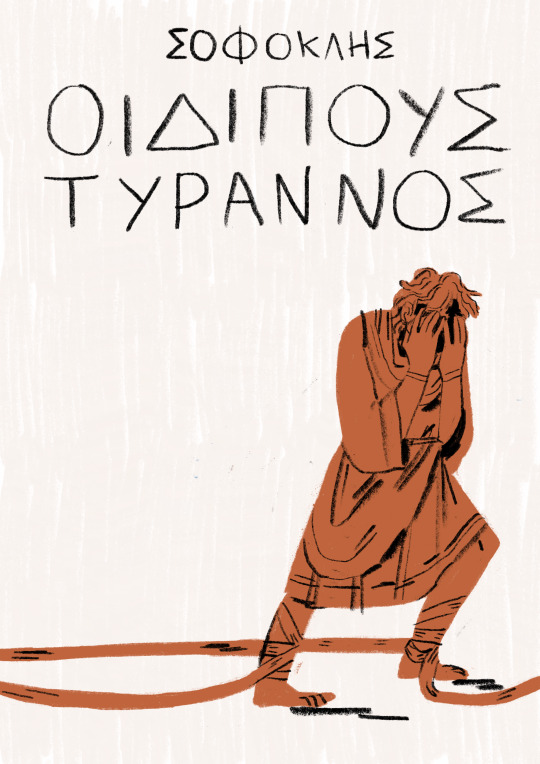
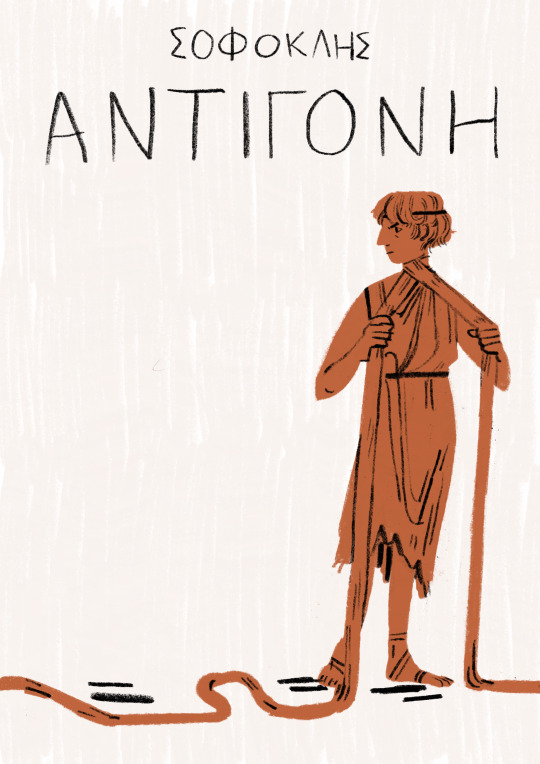
like father like daughter
704 notes
·
View notes
Text
Yeah sorry about your boyfriend… turns out he’s actually your son you thought you had killed 2 decades ago. Oh yeah he also killed your late husband… yeah the oracle was right
#oedipus#oedipal complex#oedipus Rex#ulysses dies at dawn#your boyfriend meme#boyfriend meme#the mechs#the mechanisms#Allison has jokes#agtigone#Sophocles#greek tragedy
1K notes
·
View notes
Text
2K notes
·
View notes
Text
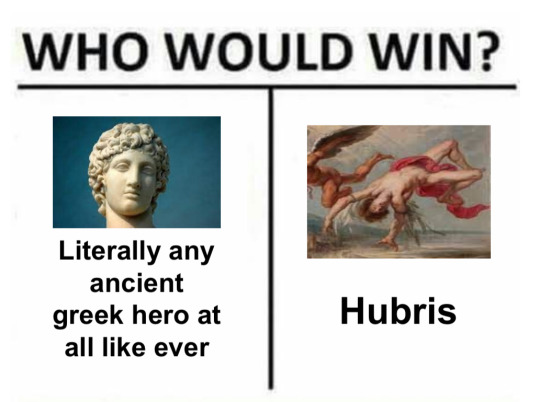
I’m looking at you Oedipus, Icarus, Odysseus, Bellerophon, Achilles, Niobe, …
#book#book memes#books#literary memes#literature#literature memes#meme#memes#bookblr#lit#myth#mythology#Greek myth#Greek myths#Greek mythology#hubris#Icarus#oedipus meme#oedipus#oedipus Rex#achilles#odysseus#the odyssey#the Iliad
209 notes
·
View notes
Text
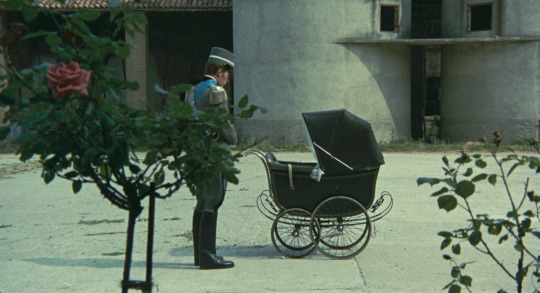
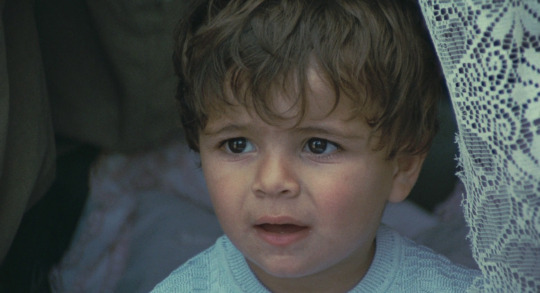

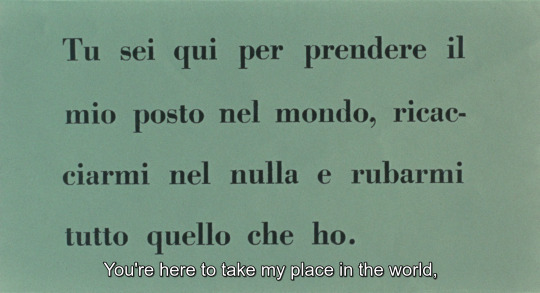
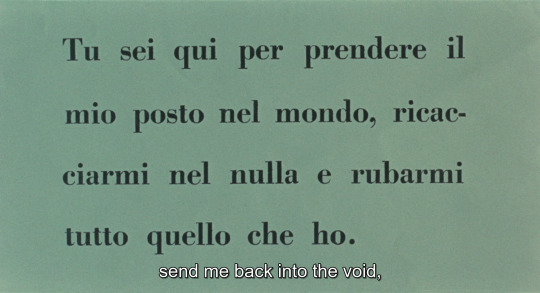


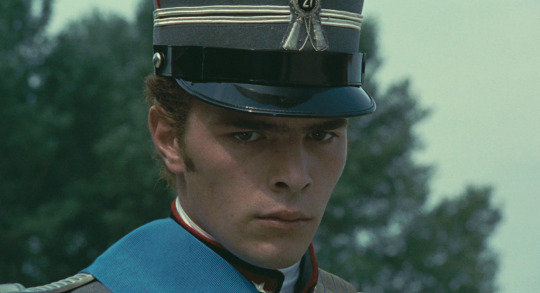
Edipo re (1967) dir. Pier Paolo Pasolini
#edipo re#oedipus rex#pier paolo pasolini#1960s#subtitles#italian cinema#60s cinema#film stills#dailyworldcinema#*caps
89 notes
·
View notes
Text


Edipo re (1967) // dir. Pier Paolo Pasolini
Porcile (1969) // dir. Pier Paolo Pasolini
#Franco Citti#Edipo re#Pierre Clémenti#Porcile#Pier Paolo Pasolini#Oedipus Rex#Pigsty#my caps#my edits#*ppp
103 notes
·
View notes
Text
Liberty versus the Tree of Life
TW: Discussion of death and grief
I received a question from @lickthecowhappy the other day on one of my metas that I'm going to try and address in this post. This is going to wander into some pretty heavy areas, and discuss some implications for S3.
They asked:
"What do you think about comparing "give me liberty (coffee) or give me death" with gaining free will via the tree of knowledge but losing access to the tree of life in the process?"
On one hand this might look like a simple choice between two things, but its not - there are shades of grey, of course. Can the two (liberty/death vs. knowledge/life) be compared? Yes - in a way. But we need to unpack the question in its entirety first.
"Give me liberty, or give me death!"
This famous quote that forms the basis of the name of Nina's coffee shop is from a reconstructed speech given by the American politician Patrick Henry in 1775, as the colonists prepared to fight against the British Empire. It is worth us having a look at the extended excerpt of the speech quoted from Wikipedia in context of what we know is coming in S3:
If we were base enough to desire it, it is now too late to retire from the contest. There is no retreat but in submission and slavery! Our chains are forged! Their clanking may be heard on the plains of Boston! The war is inevitable and let it come! I repeat it, sir, let it come. It is in vain, sir, to extenuate the matter. Gentlemen may cry, Peace, Peace but there is no peace. The war is actually begun! The next gale that sweeps from the north will bring to our ears the clash of resounding arms! Our brethren are already in the field! Why stand we here idle? What is it that gentlemen wish? What would they have? Is life so dear, or peace so sweet, as to be purchased at the price of chains and slavery? Forbid it, Almighty God! I know not what course others may take; but as for me, give me liberty or give me death!
If the mention of Boston wasn't there, you could almost read that as a crazy synopsis of S2 and S3. The Great War, that wasn't considered concluded satisfactorily and must be restarted and finished once and for all, has begun again, and is on its inexorable way. There will be storms. Some see the outcome in black and white - you either win or die; there is no other option, because they do not dare entertain it.

The fandom seems quite settled with the analogy of liberty and freedom = coffee, and six shots of espresso is Crowley's coffee preference, because he loves and protects his freedom with a passion. Crowley is that coffee, in a way - long, dark and richly intense. He is a champion of free will. Even as a demon he still gives those he tempts the choice to make their own mistakes. So how do we apply this to the coffee the Metatron offers Aziraphale, and the other option, death?
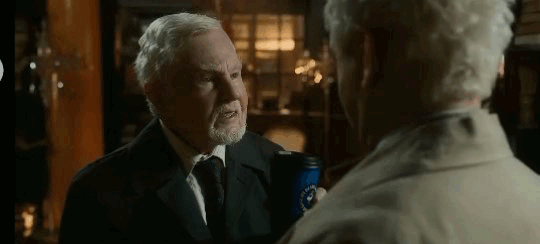
The coffee the Metatron orders and forces on Aziraphale is a message, and a warning, to the angel - "I know all about you and your demon partner." The shot of coffee in it is Crowley, the oat milk is to say Aziraphale has maybe gone a bit too far with things with Crowley while on Earth, and the almond syrup is to say they have been watched and observed do so. This is confirmed when the Metatron mentions that he knows that Aziraphale and Crowley have formed a de facto partnership.
And where would Aziraphale get his Crowley from if he went back to Heaven?
What about death? Is it a real option? What does the option of death mean anyway?
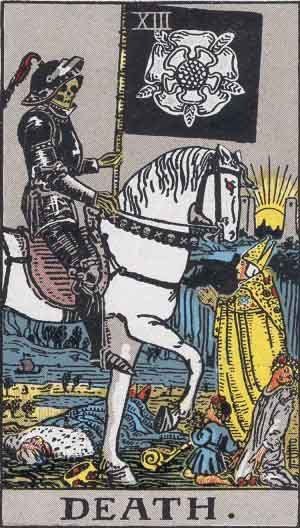
If you are not familiar with the Tarot deck, the Death card can seem quite alarming. A skeleton in black armour strides over a fallen king - death does not care for rank or position. Death cares not for riches, they will not hold it at bay. Nor will prayers. Death does not care what age you are, either. But the small, kneeling child holds a posy of flowers up as if in greeting, the only one prepared to face the rider on the pale horse; this is because children are not as always as set in their ways as adults are, and can adapt to change more easily.
Experienced Tarot users know that is what the Death card signifies when it appears: Change. Something is coming to and end, but something else is about to start as well. It's not a physical death, its a spiritual or metaphorical death. It should be a welcomed card, as it indicates there is a promise renewal and new beginnings on the horizon (see the dawning sun between the two pillars in the top right of the card?) and all one has to do is surrender to the inevitable change. But like death, making changes can sometime be a hard, fearful thing to face. Facing death, either your own or someone else's, is ultimately about accepting change.
Surrender to the British is not what Patrick Henry wanted to do. He wanted to keep the liberty he had in the new world.
But death was the only viable option Aziraphale had.
"So predictable," remarked the Metatron to Nina, when she told him people don't ever ask for death in response to his question. Death is present in Nina's coffee shop - it's the green colour on the inside walls.
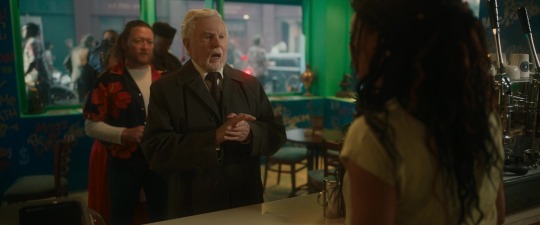
I haven't done much colour meta lately but I have been doing a lot of research on them, as I realized the original meta I wrote needed a major revision, which I plan to do soon. Green was one of those colours that needed more work.
The green on the inside walls actually has two meanings, which are both specifically tied to the coffee shop, but the first one is Death, with the capital D. This is one of the Four Horsepeople lurking in the background of S2, as Armageddon prepares to ramp up again. War is on the label of the wine bottle Crowley has in S2E5, Famine is the Marley Horse statue that Crowley puts his sunglasses on inside the bookshop, and where the stone-shaped Eccles cakes are placed in offering. Death is waiting inside the coffee shop, right next to the constraining sky-blue moral lawfulness of Heaven.
Death rides a pale horse, but the word used to describe it, "chloros," actually translates to a "pale greenish-yellow." That would have looked a bit sickly inside the coffee shop, I think, so they used a more complimentary shade of green, and one that would double up with a second meaning. Green is also the colour associated with new beginnings and the resurrection. That's why the outside of The Resurrectionist pub is dark green - it's got nothing to do with Hell (at least, I don't think it does, in this case!)
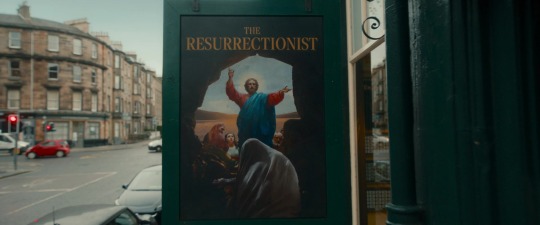
The Second Coming is in progress. Armageddon is underway again. Someone in Heaven is determined to see the supposed Great Plan come to fruition.
The Riddle of the Sphinx

In Sophocles play Oedipus Rex the titular character meets the Sphinx on a hill outside of Thebes. The monster has been devouring travelers who do not answer her riddle correctly.
"What is the creature that walks on four legs in the morning, two legs at noon, and three in the evening?"
Clever Oedipus replies with "Man," and defeated, the Sphinx departs, removing her curse from the city.
A baby crawls on four limbs into childhood, then two legs into adulthood, then on three legs with a cane for an aid into old age. This is the natural progression of life. You would not want to remain an infant forever, and similarly if you have children wouldn't you wish to see them progress from childhood to adulthood and have children of their own?
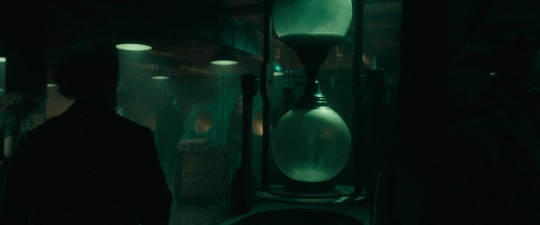
Remember Momento mori? It's a major theme in the series. Remember that you die. It's a reminder that cycles must end and restart, and that death is an important part of life. We saw the Starmaker set up a star factory, but even stars die eventually, and need to die, to make new stars. The universe recycles itself, that is how it keeps going. Sometimes we need a reminder that life is short, although sometimes it seems too long as well.

I think we too easily forget that our ineffable duo, as angel and demon, are entities that can effortlessly travel between these two worlds of life and death, as we humans see it. It's their business to do so, after all. As supernatural beings, they are eternally alive, and death has a different meaning to them - it's destruction that they fear.
The Tree of Knowledge & The Tree of Life
Aziraphale's role as Guardian of the Eastern Gate was to prevent humans returning to the Garden of Eden to access the Tree of Life after they had eaten from the Tree of Knowledge.

The Tree of Knowledge gave us questioning, curiosity and imagination. We learned, we created and in doing so made choices - we used free will. But in taking this liberty it gave us the responsibility for ourselves. It supposedly gave us the concept of sin and doing wrong, and also shorter lives to help us deal with the "agony" of this.
And the other option, the Tree of Life, that is apparently so dangerous we must be kept away from it? Is it death? No, quite the opposite - it offers eternal life, and redemption from sin. In short - a state of no change - and no choice.
To access the Tree of Life now the choice is made for you before you can arrive in front of it, in the Book of Life. If your name is in the Book on Judgement Day, you get to enter Paradise. If it is not, you will be cast down into a lake of burning sulfur (hmm, sounds familiar...) And that's it, forever and ever.

Is that really the ideal of Paradise? Yet we're made to fear the cyclic change and new growth that death brings, and want to yearn so much for the stagnation of Eternity that we rigidly structure our lives around a possible promise of it as a goal.
Eternal Life, Eternal Youth
Eternal life is not the same as eternal youth. In a cautionary tale from Ovid's Metamorphoses we have the Cumaean Sybil who lived a thousand years. She was the priestess of the oracle of Apollo at Cumae, near Naples, and apparently Apollo offered to grant her a wish in exchange for her virginity. She scooped up a handful of sand, and asked to be given as many years of life as there were grains of sand that she held. Later, she refused to sleep with the god, so he let her physical body wither away, because she had failed to ask for eternal youth as well. Her body shrunk as the years went by, and grew smaller and smaller, and eventually only her voice was left, kept contained in a jar. (And here is a link to one of the books on Jim's bookshelf - Sylvia Plath's The Bell Jar is named after the ampulla that the Sybil's voice was said to have been kept in.)
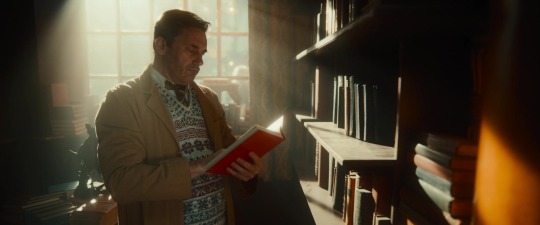
Searching for a Fountain of Youth, or creating a Philosopher's Stone for immortality has a common theme in stories through history, even from earliest times. It can be seen as a blessing, or a curse, or a fool's errand. It's a quest that is still prevalent in our modern thinking - going to the gym to build muscle, cosmetic surgery for looks only etc Queer culture has long had an emphasis on youth and beauty and growing old is anathema; freezing the body in time like in Oscar Wilde's The Picture of Dorian Gray is an aim, but our fragile mortal frames just aren't made for that. Isn't it what is inside us that counts, not the label we have applied to it?
Choices, Choices...
The time has come to make a choice: will it be the stimulating coffee of free will, or the painful change and rebirth of death, that might lead to something even better?
Perhaps you want to try the other combination: Having control and responsibility over your own short life in exchange for having to live your life to a strict set of rules so that you can then exist forever in somebody else's idea of a static ideal afterwards.
I find I'm a bit biased. But you chose what you will.
“What we call the beginning is often the end. And to make an end is to make a beginning. The end is where we start from.” T. S. Eliot
#good omens#good omens 2#good omens meta#crowley#aziraphale#the metatron#the resurrectionists#the four horsemen#sophocles#oedipus rex#the riddle of the sphinx#memento mori#the tree of life#the tree of knowledge#the cumaean sybil#the bell jar#the picture of dorian gray#the book of life#judgement day#give me coffee or give me death
59 notes
·
View notes
Text
I've been rereading Dune while also rereading some greek tragedies, specifically Oedipus Rex by Sophocles.
I don't know if I just have Dune brainrott, but Paul is so Oedipus coded???
Both of them rulers haunted by prophecy and fate since birth. Desperately trying to prevent the horrible future they have forseseen/been foretold from happening. But it all still came to pass, no matter how hard they tried??? Just the self-fulfilling prophecy of it all.
I'm just looking at the way Oedipus is described prior and after his downfall, and it fits Paul so well.

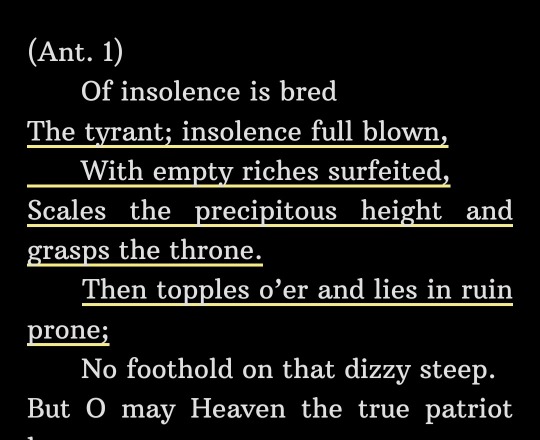
— Dune messiah spoilers —
Also, the way both of their stories end?
Oedipus gouging out his eyes with the broaches of his dead mother/wife vs. Paul knowingly allowing the plot to go through, resulting in his eyes being burned out ???
Blinding themselves after they realise the futility of all their desperate attempts to go against their preordained fate??? Realising that in a way they themselves have become responsible for it???
Doing it as a sort of repentance for their sins???
After they leave blind and broken into exile. The only person who keeps believing in them being their sister/daughter???
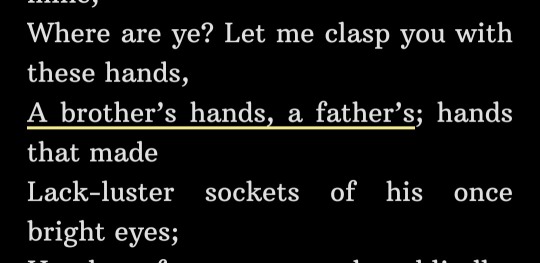
(I know Alia isn't literally Paul's daughter, but he absolutely took on a paternal role for her and took on the emotional role of a spouse for Jessica)
And after they are gone, both their legacies are forever tainted by their actions???

#i adore the greek tragedy of it all#pls i need sb to agree#the brainrot is real#now i feel like i need to reread Antigone as well#just to scourer it for alia parallels#dune part two#dune spoilers#dune messiah#paul atreides#lady jessica#st alia of the knife#alia atreides#pauljessica#oedipus rex#dune meta#dune
44 notes
·
View notes
Text
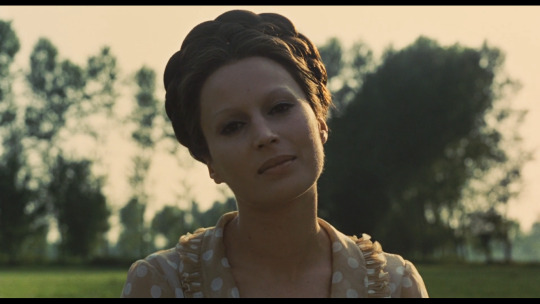


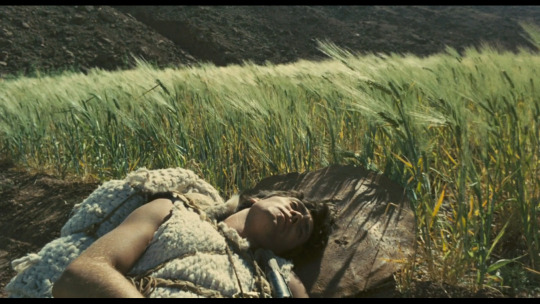

Edipo re. Pier Paolo Pasolini. 1967
#edipo re#oedipus rex#pier paolo pasolini#60s#silvana mangano#franco citti#italian film#italian cinema#cinema
42 notes
·
View notes
Photo
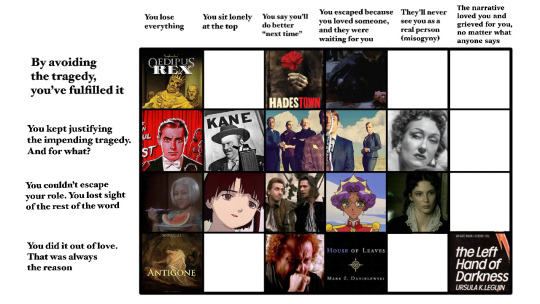
Updated tragedy alignment chart
I would have added on to the original post but I can’t find it anymore
Update 2: Lain from Serial Experiments Lain and Judas from The Last Temptation of Christ have been added! Also, moved Hadestown to the first row since it seemed more fitting.
Update 3: Added the last column as a new category after reading the book “The Left Hand of Darkness”... christ
Update 4: Damien Karras has entered the ring! From the book and movie adaptation of The Exorcist. Dyer absolved him before he died, and some background told me that the book was about whether or not he could save his soul by the end. Close enough. I like him despite the author. Still wish he lived his death made me sad for 4 months which is a long time to be sad. Also added House of Leaves. If you know you know.
#tlhod#rgu#citizen kane#oedipus rex#antigone#rosencrantz and guildenstern are dead#nightmare alley 1947#hadestown#better call saul#sunset boulevard#the idiot#fyodor dostoevsky#house 1977#nastasya filippovna#the last temptation of christ#serial experiments lain#the exorcist 1973#the exorcist by william peter blatty#house of leaves
584 notes
·
View notes
Text
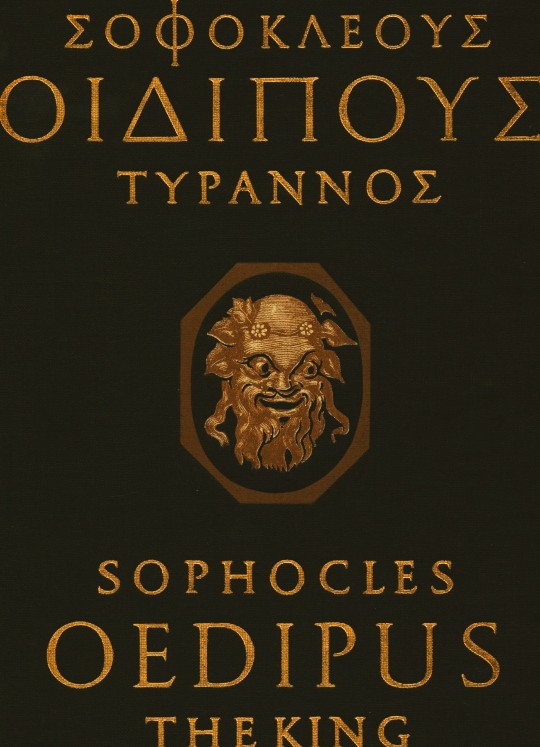
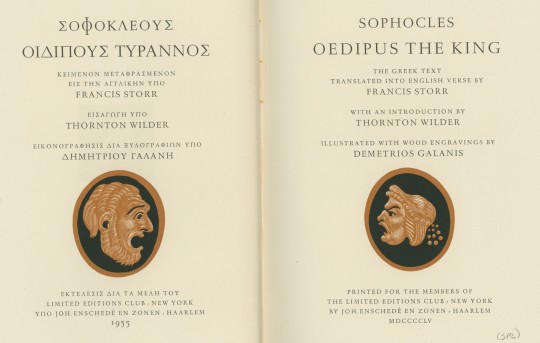
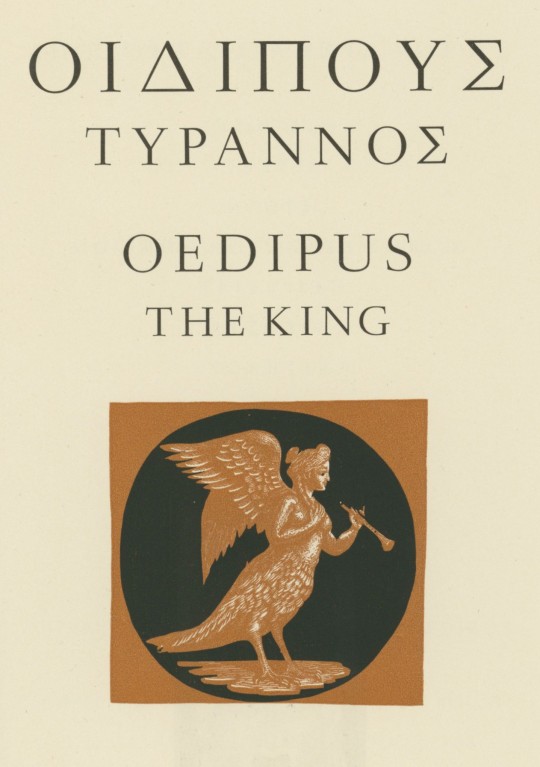


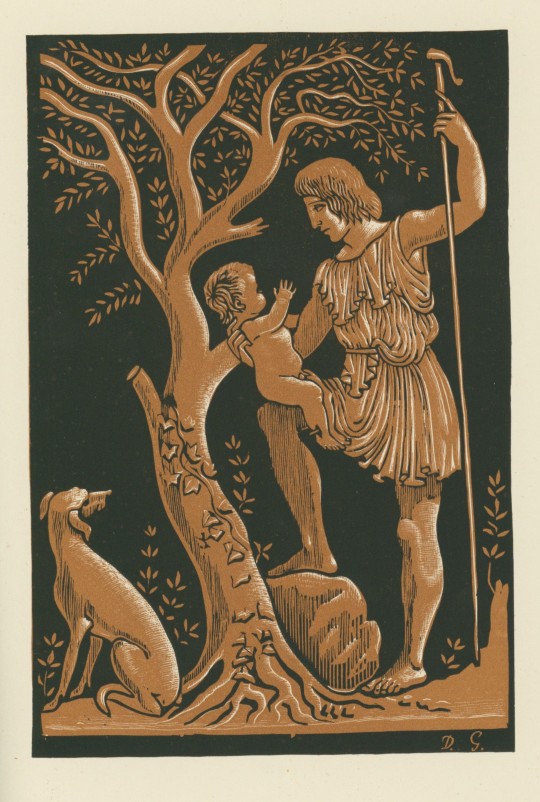
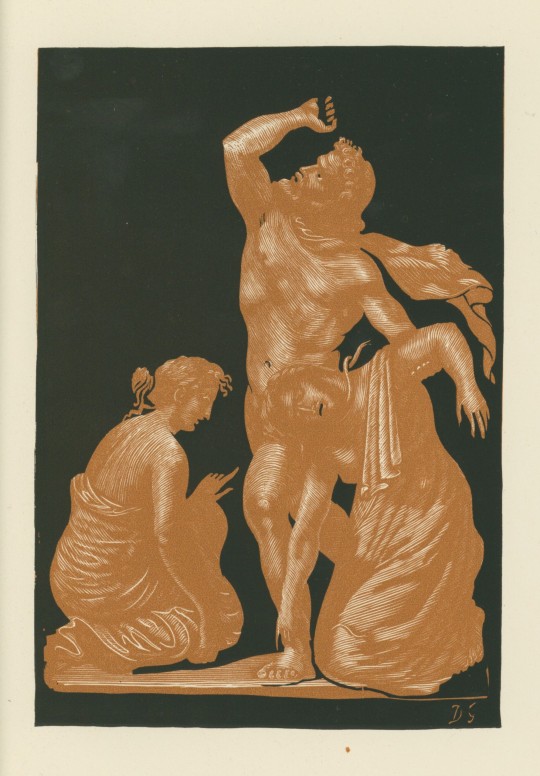

Tragically Greek
This 1955 edition of Oedipus the King, written by Sophocles, features the original Greek text alongside the English verse translation. Offering a rich, immersive reading experience results from hard work, dedication, and creative minds coming together to create this masterpiece.
Jan van Krimpen (1892-1958), Dutch typographer, book designer, and type designer, designed the two typefaces. The Greek type is named “Antigone,” and the English type is called “Romulus.” The translator for this work was Francis Storr (1839-1919), a British classicist, translator, and teacher.
The paper was specially manufactured at the historic Dutch Pannekoek Papermill, a mill with a rich history that unfortunately met its end in a fire in 1944. This exclusive feature adds a touch of rarity to your reading experience. Printed in the offices of Johannes Enschedé, under the supervision of Mijnheer van Krimpen, it was for the members of the Limited Editions Club.
Adding to the richness of this edition is the detailed and insightful introduction provided by Pulitzer Prize winner Thornton Wilder (1897-1975), American playwright, novelist, and native of Madison, WI. His esteemed perspective offers an enlightening preface to the classic tale.
The illustrations are black and terra-cotta wood engravings designed by Greek artist Demetrios Galanis (1879-1966). He was the trailblazer of modern Greek engraving and was once touted as one of the greatest living Greek artists at the time of the book’s release.
Sophocles (c. 497/496 – winter 406/405 BC) was an ancient Greek playwright born in Colonus near Athens. He is one of the three great tragedians of classical Athens, along with Aeschylus and Euripides. Sophocles wrote over 120 plays during his lifetime, although only seven have survived in their entirety. His works are characterized by their complex characters, well-crafted plots, and profound exploration of moral and philosophical themes.
Among his most famous plays is the tragedy Oedipus the King. The story is about Oedipus, the king of Thebes, who tries to uncover the truth behind a plague that has struck his city. In doing so, he discovers that he himself is responsible for the plague, having unknowingly killed his father and married his mother. The play delves into themes of fate, free will, and the consequences of one's actions.
-Melissa, Special Collections Classics Intern
View other Classics posts
#classics#sophocles#oedipus#oedipus rex#oedipus the king#greek mythology#greek#wood engraving#athens#tragedy#greek tragedy#ancient greece#oedipus complex#Limited Editions Club#Johannes Enschedé#Enschedé#Jan van Krimpen#Antigone type#Romulus type#Francis Storr#Demetrios Galanis#Pannekoek paper#LEC#Thornton Wilder
51 notes
·
View notes
Text

Oedipus rex is traumatising
#oedipus#sigmund freud#freud#greek mythology#greek tragedy#ancient greece#theater#sophocles#aristophanes#euripides#mythology#oedipus rex#antigone
53 notes
·
View notes
Text




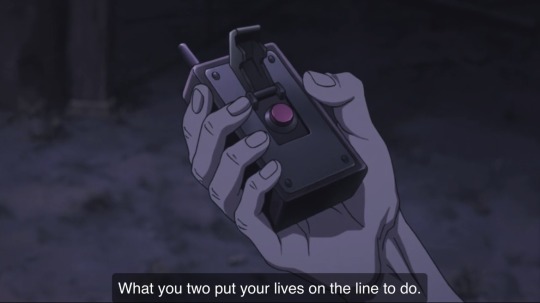

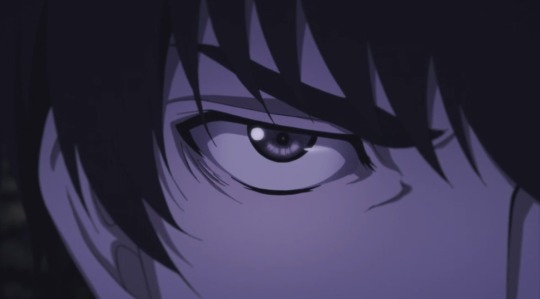

oedipus rex + children
zankyou no terror, episode 11: von
#zankyou no terror#Watch this get zero notes because no one gets this show like me#terror in resonance#1#2#oedipus rex#Tag as kin I dare you#0
44 notes
·
View notes
Text



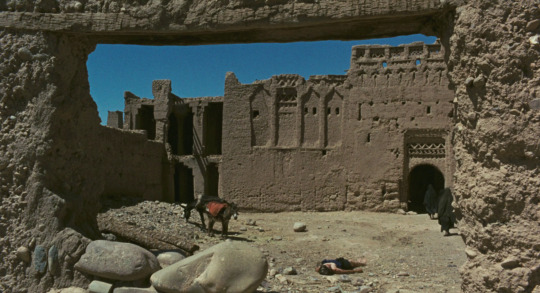
Edipo re (1967) dir. Pier Paolo Pasolini
#edipo re#oedipus rex#pier paolo pasolini#1960s#italian cinema#60s cinema#film stills#dailyworldcinema#*caps
68 notes
·
View notes